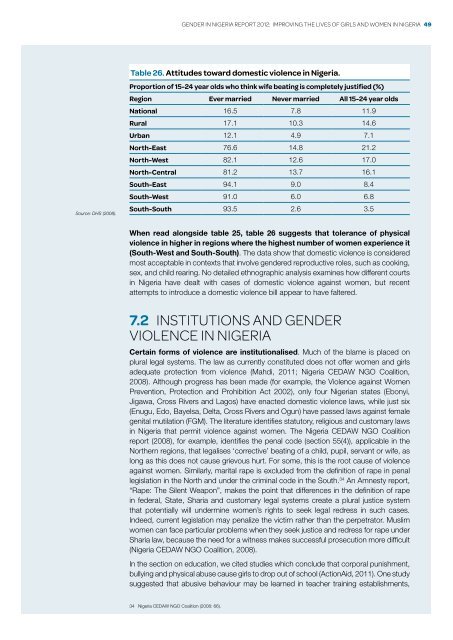Gender in niGeria report 2012 - Economic Commission for Africa
Gender in niGeria report 2012 - Economic Commission for Africa
Gender in niGeria report 2012 - Economic Commission for Africa
You also want an ePaper? Increase the reach of your titles
YUMPU automatically turns print PDFs into web optimized ePapers that Google loves.
<strong>Gender</strong> <strong>in</strong> Nigeria Report <strong>2012</strong>: Improv<strong>in</strong>g the Lives of Girls and Women <strong>in</strong> Nigeria 49<br />
Source: DHS (2008).<br />
Table 26. Attitudes toward domestic violence <strong>in</strong> Nigeria.<br />
Proportion of 15-24 year olds who th<strong>in</strong>k wife beat<strong>in</strong>g is completely justified (%)<br />
Region Ever married Never married All 15-24 year olds<br />
National 16.5 7.8 11.9<br />
Rural 17.1 10.3 14.6<br />
Urban 12.1 4.9 7.1<br />
North-East 76.6 14.8 21.2<br />
North-West 82.1 12.6 17.0<br />
North-Central 81.2 13.7 16.1<br />
South-East 94.1 9.0 8.4<br />
South-West 91.0 6.0 6.8<br />
South-South 93.5 2.6 3.5<br />
When read alongside table 25, table 26 suggests that tolerance of physical<br />
violence <strong>in</strong> higher <strong>in</strong> regions where the highest number of women experience it<br />
(South-West and South-South). The data show that domestic violence is considered<br />
most acceptable <strong>in</strong> contexts that <strong>in</strong>volve gendered reproductive roles, such as cook<strong>in</strong>g,<br />
sex, and child rear<strong>in</strong>g. No detailed ethnographic analysis exam<strong>in</strong>es how different courts<br />
<strong>in</strong> Nigeria have dealt with cases of domestic violence aga<strong>in</strong>st women, but recent<br />
attempts to <strong>in</strong>troduce a domestic violence bill appear to have faltered.<br />
7.2 Institutions and gender<br />
violence <strong>in</strong> Nigeria<br />
Certa<strong>in</strong> <strong>for</strong>ms of violence are <strong>in</strong>stitutionalised. Much of the blame is placed on<br />
plural legal systems. The law as currently constituted does not offer women and girls<br />
adequate protection from violence (Mahdi, 2011; Nigeria CEDAW NGO Coalition,<br />
2008). Although progress has been made (<strong>for</strong> example, the Violence aga<strong>in</strong>st Women<br />
Prevention, Protection and Prohibition Act 2002), only four Nigerian states (Ebonyi,<br />
Jigawa, Cross Rivers and Lagos) have enacted domestic violence laws, while just six<br />
(Enugu, Edo, Bayelsa, Delta, Cross Rivers and Ogun) have passed laws aga<strong>in</strong>st female<br />
genital mutilation (FGM). The literature identifies statutory, religious and customary laws<br />
<strong>in</strong> Nigeria that permit violence aga<strong>in</strong>st women. The Nigeria CEDAW NGO Coalition<br />
<strong>report</strong> (2008), <strong>for</strong> example, identifies the penal code (section 55(4)), applicable <strong>in</strong> the<br />
Northern regions, that legalises ‘corrective’ beat<strong>in</strong>g of a child, pupil, servant or wife, as<br />
long as this does not cause grievous hurt. For some, this is the root cause of violence<br />
aga<strong>in</strong>st women. Similarly, marital rape is excluded from the def<strong>in</strong>ition of rape <strong>in</strong> penal<br />
legislation <strong>in</strong> the North and under the crim<strong>in</strong>al code <strong>in</strong> the South. 34 An Amnesty <strong>report</strong>,<br />
“Rape: The Silent Weapon”, makes the po<strong>in</strong>t that differences <strong>in</strong> the def<strong>in</strong>ition of rape<br />
<strong>in</strong> federal, State, Sharia and customary legal systems create a plural justice system<br />
that potentially will underm<strong>in</strong>e women’s rights to seek legal redress <strong>in</strong> such cases.<br />
Indeed, current legislation may penalize the victim rather than the perpetrator. Muslim<br />
women can face particular problems when they seek justice and redress <strong>for</strong> rape under<br />
Sharia law, because the need <strong>for</strong> a witness makes successful prosecution more difficult<br />
(Nigeria CEDAW NGO Coalition, 2008).<br />
In the section on education, we cited studies which conclude that corporal punishment,<br />
bully<strong>in</strong>g and physical abuse cause girls to drop out of school (ActionAid, 2011). One study<br />
suggested that abusive behaviour may be learned <strong>in</strong> teacher tra<strong>in</strong><strong>in</strong>g establishments,<br />
34 Nigeria CEDAW NGO Coalition (2008: 66).

















